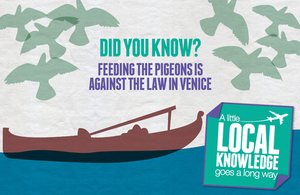Local laws and customs catching British nationals out abroad
FCO encourages people to be better prepared by researching the local laws and customs of their holiday destination before travel.

Every year British nationals risk getting caught out by local laws and customs when travelling overseas. From driving a dirty car in Russia, to wearing camouflage clothing in Barbados, travellers could end up with a hefty fine or may even be arrested if they are caught unaware.
According to new research* issued by the Foreign & Commonwealth Office, while 70% of people believe that researching local laws and customs would make their holiday more enjoyable, less than half would actually make this part of their preparations when visiting somewhere new. For those visiting places they had been to before, just 40% said they would do this research, despite the fact that local legislation and even local customs can change at any time.
In 2014, the following changes in local law were introduced:
-
fines were increased to $500 for swearing publicly in certain parts of Australia
-
new requirements were introduced for parents travelling with children in or out of South Africa
-
e-cigarettes are now banned from being brought into the United Arab Emirates
-
from January 2015 tourists must have passport valid for at least 60 days from expiry date of their visitor visa when travelling to Turkey
FCO Minister Mark Simmonds said:
It’s easy to throw caution to the wind when on holiday but it’s important to be aware of the local laws and customs before you set off. We want people to enjoy their holidays so we encourage them to be prepared. Laws and customs vary widely from country to country and visitors should respect them to avoid causing offence or even being arrested. Spending five minutes reading our travel advice may save travellers a lot of time in the long run.
Just last year, two British tourists were arrested for swimming in the Emperor’s moat at the Imperial Palace in Tokyo. This might sound like a bit of harmless fun, but their actions were the equivalent of attempting to break into Buckingham Palace – and being arrested in Japan for even a minor offence can mean remaining in custody for 23 days while awaiting an investigation.
Jaywalking in the USA, the Czech Republic and Poland; entering churches or mosques with arms or legs uncovered in Italy or Turkey; and leaving the beach still in swimwear in Mallorca and Barcelona; are just a few examples of common laws and customs broken by foreigners who didn’t research their destination before going on holiday.
How many cigarettes can you legally bring into Thailand? What equipment should you carry in your car when driving in France? What is appropriate attire to wear in public in Saudi Arabia? Wherever you are going, the FCO’s travel advice pages have a laws and customs section for each destination and are a great place to begin your research. Also take a look at our for some interesting examples from around the globe.
Further information
If you would like further information please contact 0207 781 2342 or fcoteam@consolidatedpr.com
The Know Before You Go campaign targets a number of audiences, from gap year students to package holidaymakers; sports fans to older travellers and people visiting friends and family abroad. The campaign works with more than 300 travel industry partners to communicate its messages. For more information visit our Know Before You Go page.
If you have any enquiries for FCO consular staff before you go or while abroad you can use the FCO’s Twitter service @FCOtravel. Questions are answered 9am – 6pm BST, Monday – Friday and FCO staff aim to respond within 30 minutes. This service adds to the ways that British people travelling or living overseas can already get in touch with the FCO: by emailing our travel advice team or contacting local consular staff.
You can also keep up-to-date with the latest FCO travel advice by signing up to the FCO’s Facebook and Twitter feeds.
Information about how the FCO can help British nationals abroad:
| The FCO can: | The FCO cannot: |
|---|---|
| Issue you with an emergency travel document | Help you enter a country if you do not have a valid passport or necessary visas |
| Provide information about transferring money | Give you legal advice or translate documents |
| Provide help if you have suffered rape or serious sexual or physical assault, are a victim of crime, are ill or in hospital | Investigate crimes or get you out of prison |
| Give you a list of local lawyers, interpreters, doctors or funeral directors | Get you better treatment in hospital or prison than is given to local people, but we will raise concerns if treatment falls below internationally recognised standards |
| Contact you if you are detained abroad | Pay any bills or give you money |
| Contact friends and family back home for you if you wish | Make travel arrangements for you |
| Provide help in cases of forced marriage | |
| Assist people affected by parental child abduction |
*Survey conducted by Atomik Research from a nationally representative sample of 1,000 consumers in July 2014